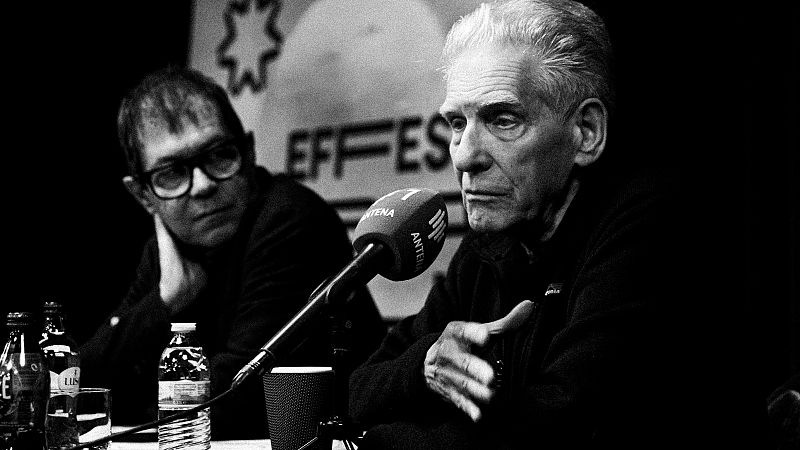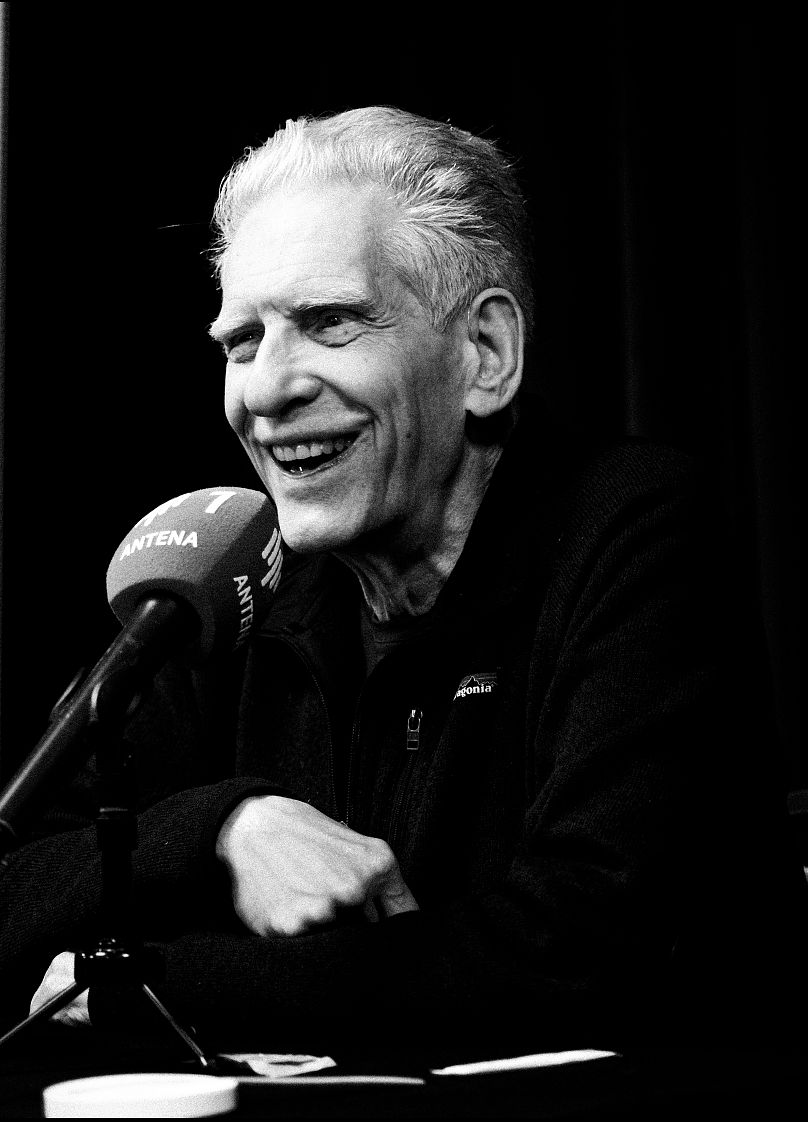David Cronenberg: 'They say I'm the godfather of body horror, but I don't know what that means'

The Shrouds is a film born out of grief. In 2017, cancer took Carolyn, the woman David Cronenberg had been married to since 1979.
After the bereavement, the filmmaker had already directed Crimes of the Future, which marked a return to body horror in the purest "Cronenbergian" style. However, for The Shrouds, he decided to immerse himself in his pain and make a film about loss, not without a touch of black humour.
Presented at LEFFEST (Lisbon Film Festival) after having already been in Cannes and Toronto, Cronenberg leaves the festival founded by his friend Paulo Branco with the Special Jury Prize.
Cronenberg spoke to a small group of journalists, including Euronews Culture, sharing the pain that motivated it and about a career spanning more than 50 years that has created a whole universe of strangeness and that is now being taken up by a new generation of filmmakers such as Julia Ducorneau*(Titane) or Coralie Fargeat(The Substance*).
Euronews Culture: How did the idea for The Shrouds come about?
David Cronenberg: It's probably common knowledge that the woman who was my wife for 43 years died in 2017. We were very close, we raised three children together. For two years, I was looking after her because she was very ill, and during that time I didn't make any films. When it was all over, I thought maybe I wouldn't make any more films.
Over time, I ended up convincing myself to make Crimes of the Future, from a script I'd written 20 years earlier, and I ended up realising that I was still interested in making films. I thought that the next obvious theme for me would be my loss, the loss of my wife, but I didn't want to make just a sentimental film about mourning. There are plenty of those... So I wanted to make my version of a mourning film, which means it would have to be both funny and sad. I didn't want to make an autobiography.
Initially, I thought of the project as a series of six or eight hours. I found someone to finance two episodes, but they decided to give up on the project. As I still believed in it, I decided to turn those two episodes into a film.
What did you make of the film's reception now that it premiered in Cannes and several other festivals this year?
I felt it didn't get enough laughs in Cannes. That's because the audience at the Cannes Film Festival is a very unusual audience. It's very special, it's not like a normal audience. There are distributors there, there are normal people who live in the city, there are many actors, directors and producers from the world of cinema.
In Cannes there are also two sets of subtitles: French and English subtitles. I think the humour got a bit lost in all this. But when we showed the film in Toronto - this is a film from Toronto, my hometown - people laughed a lot. They laughed at things that you can't understand why they laughed, because they're so Toronto, very specific to Toronto. So it was really the best reaction. In New York, there were good laughs too.
Another thing with Cannes is that they're very respectful. It's all very glamorous, people are wearing dinner jackets and they're afraid to laugh. Maybe they think they're being disrespectful if they laugh. Without humour, life isn't worth living. That's why, when I write my characters, they immediately start making jokes, whether I want them to or not.
Crash (1996), for example, is very funny, in a special way. In that respect, it's different from J.G. Ballard's book, which is very serious. The film is a combination of our two sensibilities.
Do you agree with the critics when they say that this is a return to body horror?
No, I don't agree with that at all. Honestly, I don't know what body horror is. People say I'm the godfather of the genre, but I have no idea what it is. It's not a term I've ever used.
I think it's a very realistic film. It's medical horror at best. If you're inside a medical treatment machine, that's pretty horrific. To me, that's realism. It's not body horror, it's just realism. For me, this is a very realistic film. Obviously Crimes of the Future wasn't, but this film is very realistic.
You say it's a realistic film, but it's also a spiritual film - because we don't know what lies beyond death...
Oh yes, I know what happens after death. I really do. I don't think of it as a spiritual film at all, because I'm an atheist, a very sincere atheist existentialist.
Do you want to know what happens after death? I can tell you: nothing. Oblivion. The closest I came to experiencing death was when I had an operation. You become unconscious and don't dream. You disappear. For me, that's what happens after death. That's why I wouldn't say I make spiritualist films.
You're what we call a "signature director", which means that you can immediately recognise one of your films from the first few minutes. At least that's my opinion. Vincent Cassel is also a signature actor, because he has a very particular acting style. How did the two of you work together on this film?
I've worked with Vincent Cassel twice before, on Eastern Promises and A Dangerous Method, so I know him very well. It's true that he usually plays very tough, gangster-type characters. He speaks very quickly, but in this film I asked him to speak slowly.
He's a marvellous actor. In this film, he felt he had to play me. People now even say that we look like each other, even if we don't look alike at all. He's completely changed the way he speaks, he's slowed everything down. He speaks more calmly and less emotionally, and has moulded himself to play a very specific character, as any good actor would. Although he has a French accent in the film, he also has a kind of Toronto accent, because I asked him to follow my speech model.
I also did that with Diane Kruger. She's German and speaks very perfect English. She was able to speak without an accent other than mine. I told her: "Diane, this is a Toronto film. This character is from Toronto. The accent should basically be my accent when you speak English." She did it perfectly.
There's a new generation of directors making "Cronenbergian" films. Two recent examples I can think of are The Substance by Coralie Fargeat and Titane by Julia Ducorneau. How does it feel to see new directors following your style and winning awards?
I hate it. I want to smash them (laughs). That's the answer I'd give in some places. I actually know Julia Ducourneau and Coralie Fargeat, they're both lovely women and marvellous directors. The fact that they say they were influenced by me is a source of pride. It makes me feel good. It's like having wonderful children who make films.
Your son Brandon (Possessor, Infinity Pool) is also a filmmaker...
Not just Brandon! My youngest daughter, Caitlin, has just signed her first feature film, Humane. I have two children making films.
Do you feel that their work is a legacy of yours?
No, it's funny because Brandon has his own sensibility. It's very easy to make the connection between the two of us, of course. But he has a great sense of humour, which is very unique and very different from mine. His films are also scary but funny. He has a very specific sense of humour. He wrote both scripts. Caitlin didn't write the script, but she also has her own sensibility, which you can clearly see in the film. People who know Brandon and me see both sensibilities in the films. His is quite different from mine.
The election of Donald Trump in the United States reminded me of Martin Sheen's character in your filmThe Dead Zone (1983)...
Before, people used to think that George Bush was Martin Sheen's character. Now, Trump is beyond that character. But let's not talk about American politics. I've had nine years of Trump and American politics and I think I need a break. I refuse to read any newspaper articles about Trump, which means I don't read any newspapers, because he's everywhere.
My question was whether you think we live in times when reality can equal the wildest fiction.
Of course we do. For example, the Veep series is obsolete, because what has happened is more comedy than Veep ever was. Donald Trump is a satire, so it's a bit hard to top him. Speaking of being realistic, he's not realistic. He's not a realistic character. You could say he was invented by a madman.
You're a regular at LEFFEST. Is it important for you to come here?
Absolutely, I always have wonderful encounters here. It was here, for example, that I met Don DeLillo, whose novel "Cosmopolis" I went on to adapt for the cinema. I've met some fantastic people here, and not just from the world of cinema.
Do you have any upcoming film projects?
I'm in talks with the Hungarian-Canadian producer Robert Lantos to perhaps make a film out of my novel "Consumed".
David Cronenberg's The Shrouds premiered at this year's Cannes Film Festival and will hit European cinemas at the beginning of 2025.
LEFFEST closes with triumph for Iranian film
While Cronenberg's film won the João Bénard da Costa Grand Jury Prize ex-aequo with Rithy Panh's Rendez-vous avec Pol Pot, the festival's main prize - the NOS Grand Prize - went to The Seed of the Sacred Fig, by Iranian Mohammad Rasoulof.
The film, which has already won awards at Cannes, tells the story of a judge forced to sign death warrants amid widespread protests in the country, until he comes into conflict with his own family. Rasoulof, who was imprisoned and forced to leave Iran, was present at LEFFEST to present the film.
Today


